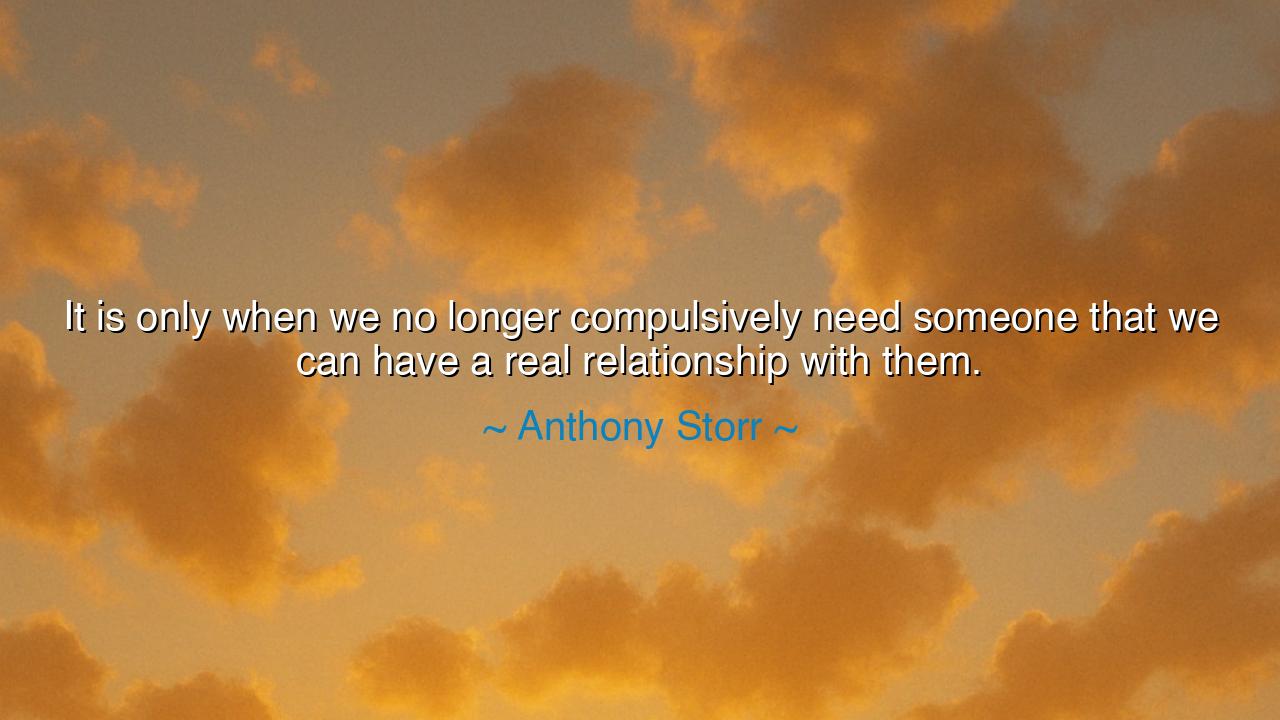
It is only when we no longer compulsively need someone that we
It is only when we no longer compulsively need someone that we can have a real relationship with them.






Hearken, O seeker of truths, to the words of Anthony Storr, a sage of the human spirit, who whispered across the ages: "It is only when we no longer compulsively need someone that we can have a real relationship with them." In this utterance lies the ancient teaching of freedom within the heart, the recognition that attachment born of necessity is not true union, but a tether that binds the soul in chains. The wisdom of restraint and self-mastery is hidden here, for only when desire does not clutch with desperate hands can one encounter the other fully, without the shadow of compulsion.
From the scrolls of human experience, we learn that need often masquerades as love. It is a hunger that seeks to fill the emptiness within, a fire that burns for possession rather than connection. Storr illuminates that a real relationship—a bond suffused with mutual respect, understanding, and care—cannot flourish amidst the thorns of clinging dependency. It demands the courage to face our own completeness, to recognize that our wholeness does not arise from another, but is cultivated in the silence of self-knowledge.
In the theater of life, the compulsive heart wields power over sight and reason, blinding the seeker to the presence of the beloved. Only when the mind is serene and the spirit unbound does the soul behold the other in truth, without the distortions of fear or longing. Storr’s insight beckons us to master the art of inner freedom, for it is freedom alone that permits the flowering of genuine affection, where two beings meet not out of need but in the joy of shared being.
Consider the ancients, who spoke of friendship as a sacred covenant, of love as an elevation of spirit rather than a tether of survival. They understood that to truly love is to grant space, to relinquish demand, to allow the beloved to shine unshadowed by our insecurities. Storr’s voice resonates with this perennial wisdom, reminding all who listen that the purest bonds are forged not from craving, but from the serenity of hearts untethered, hearts willing to embrace the other as a mirror, not a lifeline.
Thus, O descendants of reflection, let this teaching lodge in your hearts: the path to a real relationship is the path of self-possession, of quiet mastery over the compulsions that seize the spirit. In liberation from need, the soul may extend its hand, not to clutch, but to honor; not to consume, but to celebrate the presence of another. Herein lies the ancient and eternal truth: only when the self stands complete may love truly dwell.






TTTuan tu
Storr’s quote presents an interesting idea, but can someone truly stop needing another person emotionally? Is it possible to have a relationship without any degree of emotional need or desire? Perhaps this is a more philosophical way of talking about self-sufficiency in relationships. But how does that work in the real world, where people often lean on each other for comfort and support?
BLTran Bao Long
On one hand, I agree that a healthy relationship should not be built on dependency. But on the other hand, could this perspective be overly idealistic? Are relationships not often about both partners relying on each other, especially in times of difficulty? Is there a difference between healthy interdependence and unhealthy neediness?
LPLan phuong
This idea strikes me as a call for emotional maturity—when we are no longer 'needy' in a relationship, we can truly appreciate the other person for who they are. But doesn’t it also raise a question: what happens to the people who are emotionally vulnerable and still working through dependency issues? Can they ever reach that 'real' relationship?
TATruc Au
I understand Storr’s point, but I wonder if it’s possible to have a healthy relationship without some form of need. Isn’t it natural to want to feel wanted, and to want someone by your side? If we don’t need each other in any way, does that imply a lack of emotional investment or commitment?
LLLinh Le
This quote seems to suggest that true intimacy comes from independence, rather than dependence. But isn't a degree of mutual need and support necessary for a strong relationship? If we stop needing someone entirely, can we still maintain the closeness that makes relationships meaningful? How do we balance the desire for independence with the need for connection?